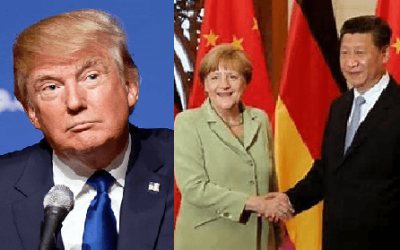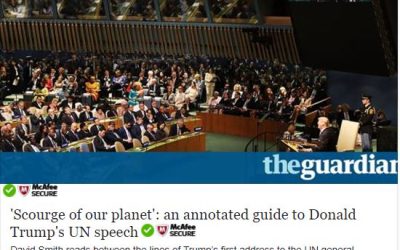An immense human catastrophe is threatening in parts of Africa and in Yemen. As the Washington Post wrote in February: “The world is in the grip of an astonishing and acute crisis: More than 20 million people in South Sudan, Somalia, northern Nigeria and Yemen face starvation in the next six months, according to the United Nations. Nearly 1.4 million children are at ‘imminent risk’ of death. The scale of the hunger epidemic was described last month by US-based researchers as ‘unprecedented in recent decades.’… ‘The situation is dire,’ warned UN Secretary General Antonio Guterres, in a desperate appeal for funds. ‘We need $4.4 billion… to avert a catastrophe.’
Most urgently, flowing from this catastrophe, all countries must mount an urgent relief effort coordinated through the UN. However, to deal with this disaster and prevent future ones, it is vital to realize this calamity is human made, not natural. New such catastrophes can therefore be prevented by human action. As the Washington Post article mentions “The crises are in large part man-made, stoked by ruinous conflicts, collapsing governance and international indifference. Only in one country, Somalia, which is recovering from years of war, is drought the main cause of the current food shortages.”
Most urgently, flowing from this catastrophe, all countries must mount an urgent relief effort coordinated through the UN. However, to deal with this disaster and prevent future ones, it is vital to realize this calamity is human made, not natural. New such catastrophes can therefore be prevented by human action. As the Washington Post article mentions “The crises are in large part man-made, stoked by ruinous conflicts, collapsing governance and international indifference. Only in one country, Somalia, which is recovering from years of war, is drought the main cause of the current food shortages.”
The underlying cause of this disaster is that 766 million people in the world, over 10 percent of the population, live in extreme poverty as defined by World Bank criteria: daily expenditure of $1.90. Such incomes are so low that if the situation is worsened by any further factor famine can unfold. South Sudan’s civil war, Yemen’s civil war and foreign intervention and actions by Nigeria’s terrorist Boko Haram have tipped already poor societies into the catastrophic threat of famine.
Alongside the urgent relief efforts, both the underlying causes and the immediate events producing these catastrophes must be understood.
The underlying cause is global poverty. The facts on this demonstrate dramatically the failure of the Western “Washington Consensus” and show that changes in economic policy away from this model can produce dramatic improvements.
Socialism has proved itself hugely more successful than capitalism in eliminating global poverty. Above all, since 1981 socialist China lifted 853 million people out of internationally defined poverty – 75 percent of the world’s total reduction. Socialist Vietnam lifted 31 million people out of similarly defined poverty. Together socialist countries account for 78 percent of world poverty reduction – lifting 887 million people out of poverty. In contrast, capitalist countries, dominated by the Washington Consensus, only achieved 250 million.
On the latest World Bank data only 92 million people live in internationally defined poverty in socialist countries compared to 789 million in capitalist ones. Only 6 percent of the population of socialist countries live in poverty compared to 14 percent in capitalist ones.
The fundamental backdrop to developing famine is that 388 million people live in poverty in sub-Saharan Africa and only 10 million people have been taken out of poverty since the peak year of 2010. Against such a fragile social background a new strain can produce a disaster.
In contrast, more correct economic policies produce great improvement. From 1983 to 1985 Ethiopia suffered catastrophic famine. But from 1991, due to policies driven by state investment, in contradiction to the Washington Consensus, Ethiopia has achieved an annual average 7.3 percent economic growth – one of the world’s fastest.
Sub-Saharan Africa and the Middle East’s situation is worsened by US and EU policies. Both dump subsidized agricultural products into world markets. African farmers cannot compete, are driven out of business and national food self-sufficiency is undermined – further creating conditions for famine.
Superimposed on this, the world economic slowdown caused by the international financial crisis starting in the US in 2008 sharply increased political instability. An arc of military conflict has been created from Nigeria in West Africa, through Libya and Southern Sudan in North Africa, into Syria, Iraq and Yemen in the Middle East and extending north into Ukraine and eastward into Afghanistan.
Western military interventions worsened this situation. The unilateral US Iraq invasion and bombing of Libya transformed “jihadist” organizations from fairly powerless groups into those controlling large areas of Iraq, Syria, Libya and Nigeria. External military intervention in Yemen produced famine. The results rebounded on the EU, with refugee waves attempting to flee the Middle East and North African.
Instead of learning the lessons, which now threatens to create catastrophic famine, Western governments have attempted to ignore this disaster. The Washington Post article “The world is ignoring an ‘unprecedented’ starvation crisis” also notes that Trump has threatened to cut UN contributions.
What conclusions follow from this threat of catastrophic famine?
First, whatever other differences, all countries must urgently cooperate on famine relief.
Second, the economics of the neo-liberal Washington Consensus have to be abandoned and policies closer to China’s socialist development model adopted.
Third, unilateral external military interventions, which worsen the situation, must end.
* * *
This original version of this article appeared at Global Times on 6 March 2017.
Related articles
China’s ‘socialist development strategy’ outperformed Western alternatives
This article finds that the 1st, 2nd, 3rd, and 4th fastest growing economies during the period since the ...
Read More Economic logic behind Trump’s foreign policy – the key countries are Germany &China
This article was published in Chinese before the recent summit between Chancellor Merkel and President Trump - which ...
Read More Consequences and lessons of the new U.S. bank collapses
This article was originally published in Chinese at Guancha.cn. The collapse in rapid succession of Silicon Valley Bank ...
Read More Why do Cubans live longer than Americans?
Cubans live almost a year longer than Americans. So it must come as news to them that Trump ...
Read More China’s economy is growing three times as fast as the US
Publication of US GDP for the 2nd quarter of 2017 means data is now available for both China ...
Read More 







If those famine stricken countries were capitalist, they wouldn’t be famine stricken countries.